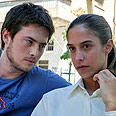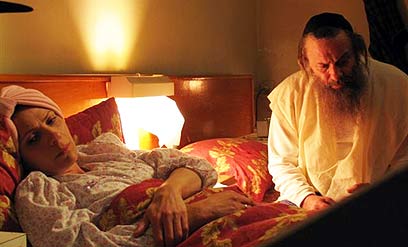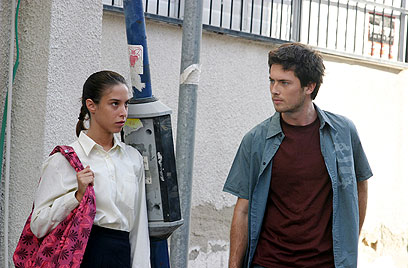
A recent conference titled "Representations of women in the Israeli cinema", held at the Schechter Institute of Jewish Studies in Jerusalem, discussed changes in the status of women depicted on film and TV. Director Einat Kapach surveyed the representation of religious women in Israeli cinema and the changes they have underwemt.
"Until the 1990s religion was virtually completely absent from Israeli cinema and religious women were very rare," Kapach says. "If they did appear it would be in stereotypical roles in comedies. They either cooked or wanted to marry off one of their children. They did not appear as heroines. They were passive and religion was presented in an embarrassing manner."
While 1980s Israeli films mainly focused on political issues, the 1990s saw more socially-driven features . That's when religious characters came into the scene. "'Shuru' is one of the first films marking the transition to addressing our culture and the search for spirituality in empty Tel Aviv," Kapach says.
"In Hana Azoulay-Hasfari's film 'Sh'chur' we encounter strong, opinionated religious women but the film does not deal with the representation of women but that of the Mizrahi culture," she notes.

Joseph Cedar. Showcasing religious society (Photo: AFP)
The most prominent director to showcase religious society is Joseph Cedar. However, his protagonists are usually religious men while the religious female characters are less than endearing.
"There are religious people in his first film 'HaHesder' but the setting is masculine political," Kapach says.
"Four years later with 'Madurat Hashever' Cedar criticized the settlement enterprise. He focused on three women facing social dilemmas. The religious factor is not an issue. But these women are passive victims. The heroine is a single mother and that immediately makes her weak in the eyes of the religious society and the milieu she wants to join. The film's agenda does not concern women and the woman is seen as vulnerable."

Shuli Rand and Sharon Hacohen in 'My Father My Lord'
So is there a movie which depicts religious women in a positive light?
"There aren't many. In 'Madurat Hashevet' you pity the heroine, in 'Ushpizin' there's a wonderful woman but it's very clear where she belongs. The whole film is based in the haredi world and the dilemmas it presents.
"In the film 'My Father My Lord' we have a dominant haredi family. The woman is made dominant mainly by her anger towards her husband who she feels is responsible for the death of their child. Her anger is what makes her presence so powerful. She has harsh criticism towards her husband and G-d and that gives her a personal perspective. Nevertheless, she remains a passive haredi woman whose role in the house is very clear.
"In fact, there are hardly any films where I like the religious heroine. Perhaps Rochale in the TV series 'A Touch Away'. She was very unique. Her character was a charming, chaste haredi girl who falls in love with the wrong guy. She was a character one could fall in love with."

'A Touch Away.' 'Charming, chaste lead character' (Photo: Yoni Hamenachem)
Kapach hopes the younger generation will give more room for significant female religious characters. "The religious woman in cinema has turned into a far more well-rounded character who is no longer just the wide-of and can face various dilemmas which are not exclusive to the religious world."
What do female religious heroines have in common?
"The way they dress. I think that beyond the garment, it makes a difference when they look good. In the past, religious women were perceived as distant, foreign and threatening. They were mostly seen wearing a headdress or a wig. Clothing does something, it shows a different side."
So all they have to do is dress nicely?
"What is needed is for religious women to write more films."
- Follow Ynetnews on Facebook















